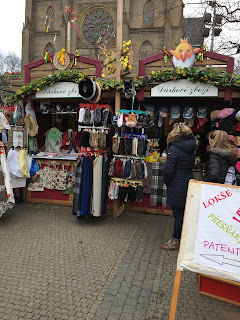Easter Celebration Without the Resurrection

We recently found that Prague has Easter markets in several squares around the city. Similar to the Christmas markets, the little wooden booths are set up in open spaces (often in front of churches) several weeks before Easter to sell seasonal decorations and products. They bring some color to the early spring atmosphere. Every market we've seen has an Easter egg tree decorated with colorful ribbons and giant eggs. Chicks, baby bunnies, and colorful eggs abound in these markets. Colorful spring decorations for your house can be purchased from several vendors. There are also vendors selling food and drinks. One of the vendors was dressed in a traditional Czech costume, so he could sell his Czech food. Among all these wares that could be purchased at the Easter market, one thing was missing. Nothing explained the reason for the Easter season. No mention at all of the death and resurrection of our Savior Jesus Christ. At least in the Christmas markets, a ma

